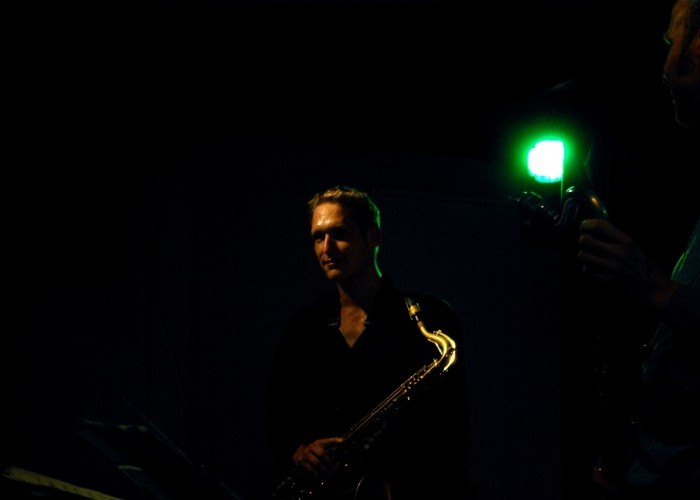Jan 13, 2026 2:09 PM
More Trump-Kennedy Center Cancellations
The fallout from the renaming of the John F. Kennedy Center for the Performing Arts to include President Donald…

Saxophonist Philipp Gropper works in many disparate contexts, playing in bands led by vibrant German musicians, including bassist Pablo Held and fellow saxophonist Wanja Slavin, in addition to co-leading the electro-acoustic foursome Tau.
(Photo: Roland Schulz)Few cities in Europe today are more cosmopolitan than Berlin.
During the past few decades, the city has attracted a steady influx of adventurous musicians looking for artistic camaraderie, and that’s produced a dynamic, artistically bold jazz and improvised music scene with a seriously international tinge. Saxophonist Philipp Gropper is something of an oddity in that regard, because he was born and raised there. In fact, as a youngster falling in love with jazz, he mostly was absorbed by music from America. He vividly recalls seeing performances by Don Cherry, Michael Brecker and Wayne Shorter, but admits he wasn’t aware of the music Berlin often is celebrated for—the free-jazz propagated by the FMP label and the cross-stylistic work of its expat community.
That awareness shifted when he started meeting younger players, including colleagues he encountered while working in German youth orchestra BuJazzO, led by Peter Herbolzheimer. In 2003, Gropper formed Hyperactive Kid, one of his first bands, with drummer Christian Lillinger and guitarist Ronny Graupe, two fellow members of the orchestra. It would become one of the most exciting homegrown German bands of the current century.
“We started playing as a trio without bass, because of the joy we felt during our first session, to which the bass player didn’t show up,” said Gropper, 40.
The musicians threw themselves into the project, slowly establishing themselves as a rising force, tapping into post-bop fundamentals, but pushing forward with punishing rhythms and post-punk noise.
“For years, we tried to play every concert we could, driving around Germany and, later on, Europe in a car. Rehearsing a lot, playing everything by ear, listening to so many recordings in the car, discussing music,” the saxophonist said.
The trio, which eventually rechristened itself Gropper/Graupe/Lillinger, carries on to this day—with a new album in the works for 2018. But each member has developed numerous other projects. In recent years, Gropper has delivered his most profound work in a quartet called Philm, which recently dropped the impressive Live At Bimhuis.
Gropper works in many disparate contexts, playing in bands led by vibrant German musicians, including bassist Pablo Held and fellow saxophonist Wanja Slavin, in addition to co-leading the electro-acoustic foursome Tau. He knows the struggle in balancing the need to earn a living while developing a genuine musical identity, and said he was lucky enough to be satisfied in all of the numerous projects he’s involved with, while lamenting the inability to go deeper in any of them.
“That is the most depressing part of the jazz world,” he said. “I see so much potential in so many groups, if they would only have the chance to work more and play more.”
Despite that situation, his primary outlet, Philm—a quartet with keyboardist Elias Stemeseder, bassist Andreas Lang and drummer Oliver Steidle—seems to be reaching its potential. On last year’s Sun Ship (WhyPlayJazz), he arrived at new heights with a hurtling attack marked by chamber-like interplay and driving, yet fractured, propulsion. Steidle’s drumming reflects the lurching complexity of Jim Black’s approach, while Stemeseder enhances his elegant piano attack with spacey synthesizer textures and noise. Gropper’s sinewy tenor lines toggle effortlessly between post-bop lyricism and experimental, coloristic explorations more in tune with the Berlin underground.
“I am deeply connected to tradition and constantly try to understand and carry forth its liveliness and fire,” he said. But it’s clear that Philm reflects a forward-looking vision, something open to change. “The sounds that I, as a composer, and we, as Philm, are inspired by become more diverse day by day. We have constant exchanges about recent discoveries. The music—forms and rhythms—I compose and we play are relatively complex. But that only makes sense to me if it’s really internalized. The message of joy and adventure has to be so direct that listeners feel it without understanding the theory behind it.” DB

Belá Fleck during an interview with Fredrika Whitfield on CNN.
Jan 13, 2026 2:09 PM
The fallout from the renaming of the John F. Kennedy Center for the Performing Arts to include President Donald…

Peplowski first came to prominence in legacy swing bands, including the final iteration of the Benny Goodman Orchestra, before beginning a solo career in the late 1980s.
Feb 3, 2026 12:10 AM
Ken Peplowski, a clarinetist and tenor saxophonist who straddled the worlds of traditional and modern jazz, died Feb. 2…

The success of Oregon’s first album, 1971’s Music Of Another Present Era, allowed Towner to establish a solo career.
Jan 19, 2026 5:02 PM
Ralph Towner, a guitarist and composer who blended multiple genres, including jazz — and throughout them all remained…

Rico’s Anti-Microbial Instrument Swab
Jan 19, 2026 2:48 PM
With this year’s NAMM Show right around the corner, we can look forward to plenty of new and innovative instruments…

Richie Beirach was particularly renowned for his approach to chromatic harmony, which he used to improvise reharmonizations of originals and standards.
Jan 27, 2026 11:19 AM
Richie Beirach, a pianist and composer who channeled a knowledge of modern classical music into his jazz practice,…